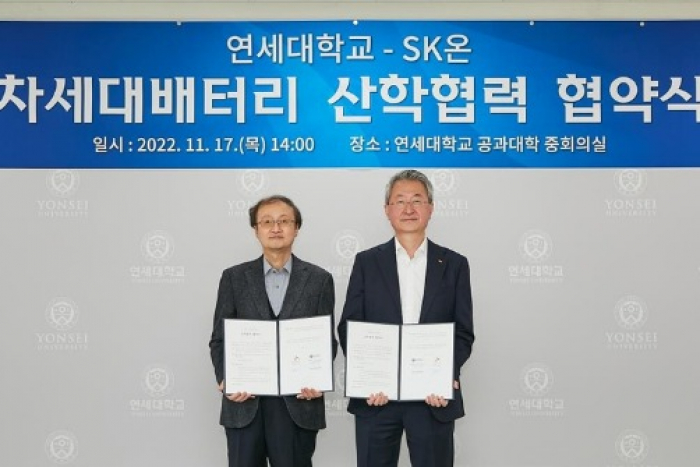Batteries
SK On, Korean colleges to conduct R&D of next-generation batteries
The battery company agrees with Yonsei and Hanyang universities to jointly study solid state cells
By Nov 18, 2022 (Gmt+09:00)
2
Min read
Most Read
LG Chem to sell water filter business to Glenwood PE for $692 million


Kyobo Life poised to buy Japan’s SBI Group-owned savings bank


KT&G eyes overseas M&A after rejecting activist fund's offer


StockX in merger talks with Naver’s online reseller Kream


Mirae Asset to be named Korea Post’s core real estate fund operator



South Korean battery maker SK On has raised its research and development (R&D) capacity in next-generation cells by joining forces with the domestic universities of Yonsei and Hanyang.
The company on Thursday said it signed an agreement with Yonsei University at the latter's Engineering Hall 1 in Seoul on forming an industry-academic cooperation center. The signing ceremony was attended by SK On CEO Jin Kyo-won and Park Seung-han, the university's vice president for research affairs.
Earlier that morning, SK On signed a similar accord at a ceremony hosted by Hanyang University's Fusion Technology Center in Seoul's Seongdong-gu District attended by Choi Kyoung-hwan, the company's executive vice president for next-generation batteries, and Kim Chan-hyeong, dean of the school's College of Engineering.
Under this agreement, SK On and the two universities will jointly study innovative technologies for next-generation cells based on source technology research, including that on the development of lithium protective layer materials, to expedite the development and commercial application of such batteries.
Both schools have published papers on and registered patents for solid state cells, also known as 'dream batteries.' The cooperation center will see participation from faculty members and graduate researchers specializing in next-generation cells.
The company previously concluded contract departments with Hanyang, Sungkyunkwan University, and Ulsan National Institute of Science and Technology and plans to hire up to 200 graduates from these departments over a five-year period starting with the first graduating class.
SK On is thus raising its R&D capacity to achieve its goal of commercializing solid state batteries by 2029.
In Korea, SK On's Emerging Energy Research Center in Daejeon, a facility dedicated to next-generation cell development, is producing on its own solid electrolytes based on sulfide, oxide and polymer and lithium metal anodes.
The company is focusing on R&D of lithium protective layer materials for the development of solid-state battery materials and longer cell life through design and synthesis of core materials for solid electrolytes and cathodes.
The company is also investing in advanced companies abroad and doing joint projects with researchers.
In October last year, SK On invested $30 million (35 billion won) in Solid Power, a leading American company for solid state batteries based in Louisville, Colorado, to develop prototypes of new solid state batteries based on sulfide as early as 2025 and launch mass production in 2029.
CEO Jin said, "As evidenced by its high nickel technology, SK On's outstanding R&D capacity will see a further boost through collaboration with universities."
Write to Hyung-Kyu Kim at khk@hankyung.com
More to Read
-
 BatteriesSK On to buy battery material lithium hydroxide from Chile's SQM
BatteriesSK On to buy battery material lithium hydroxide from Chile's SQMNov 06, 2022 (Gmt+09:00)
1 Min read -

-

-
 BatteriesPOSCO to build largest solid electrolyte plant for batteries
BatteriesPOSCO to build largest solid electrolyte plant for batteriesMar 15, 2022 (Gmt+09:00)
2 Min read
Comment 0
LOG IN


